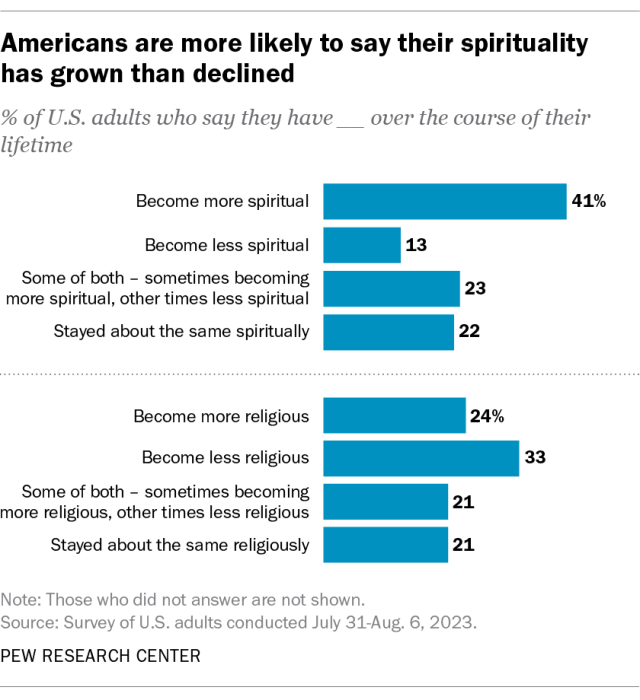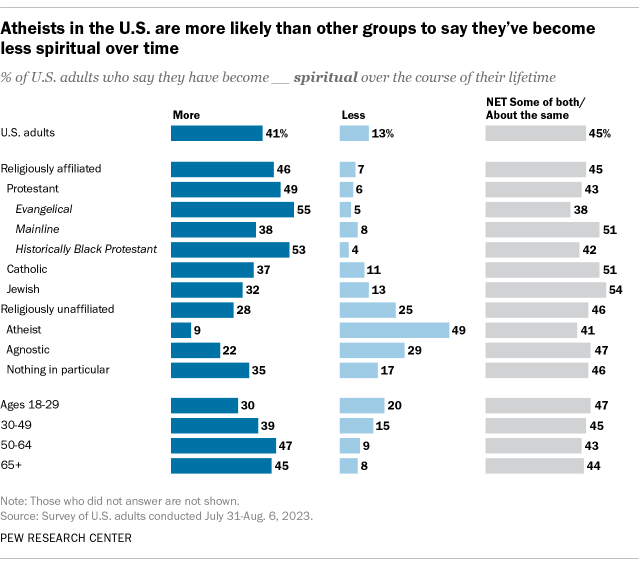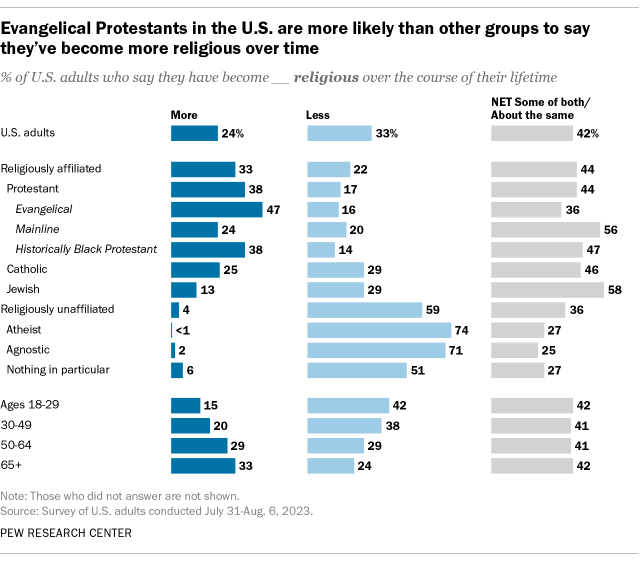
Most Americans are spiritual or religious in some way and many also say their spirituality and level of religiosity have changed over time.
But Americans are far more likely to say they have become more spiritual than to say they have become more religious, according to a new analysis of a 2023 Pew Research Center survey.
Pew Research Center conducted this analysis to explore how Americans say their spirituality and religiosity have changed over their lifetime. It is based on the report “Spirituality Among Americans,” for which we surveyed 11,201 respondents from July 31 to Aug. 6, 2023. All respondents to the survey are part of Pew Research Center’s American Trends Panel (ATP), an online survey panel recruited through national random sampling of residential addresses, which gives nearly all U.S. adults a chance of selection. The survey is weighted to be representative of the U.S. adult population by gender, race, ethnicity, partisan affiliation, education, religious affiliation and other categories. For more, refer to the ATP’s Methodology.
Here are the questions used in this analysis, along with responses, and its methodology.

Some 41% of U.S. adults say they have grown more spiritual over the course of their lifetime, compared with 24% who say they have become more religious.
In contrast, 13% of U.S. adults say they have become less spiritual over time, while 33% say they have become less religious.
The rest say their spirituality and level of religiosity have either stayed the same or fluctuated – sometimes increasing and at other times decreasing.
We asked respondents how their spirituality and religiosity have changed as part of a wider U.S. study that explored the concept of spirituality and how it differs from religion. We did not define the words “spiritual” or “religious” in the survey, nor did we ask whether any changes in spirituality or religiosity were part of a gradual long-term shift, a sudden dramatic one or something else.
However, the broader study did ask respondents to describe, in their own words, what the word “spirituality” means to them. Roughly a quarter gave descriptions tied to organized religion – for example, citing a belief in God, Jesus, the Holy Spirit or other elements of Christian theology.
About a third of respondents offered responses that we categorized as “beliefs in something else,” such as belief in a higher power or belief in the unseen or otherworldly.
Which Americans have become more spiritual – or less?
Evangelical Protestants (55%) and members of the historically Black Protestant tradition (53%) are especially likely to say they have become more spiritual over the course of their lifetime. Few in those groups say they have become less spiritual.
On the other hand, among religiously unaffiliated Americans, 28% say their spirituality has grown over time, while 25% say it has declined. Religiously unaffiliated Americans are those who say they are atheist, agnostic or “nothing in particular.” Atheists in particular stand out: Just 9% say they have become more spiritual over time, while 49% say they have become less spiritual.

Differences by age
In all age groups we analyzed, respondents are more likely to say they have become more spiritual over time than to say the opposite.
However, the differences are starker among older Americans. For example, among those who are 65 and older, 45% say they have become more spiritual over time, while only 8% say they have become less spiritual. Among U.S. adults under 30, by comparison, 30% have become more spiritual and 20% have become less so.
Which Americans have become more religious – or less?
Some 47% of evangelical Protestants say they have become more religious over time – a higher share than among any other religious group analyzed. Members of historically Black Protestant churches also are especially likely to say they have become more religious.
Far fewer evangelicals (17%) and members of the historically Black Protestant tradition (14%) say they have become less religious over time.
Catholics and mainline Protestants are more divided, with roughly similar shares in each group saying they have become more religious and less religious over time.
At the other end of the spectrum, Jewish adults (13%) are the least likely of the religiously affiliated groups analyzed to say they have become more religious over time, with a far larger share (29%) saying they have become less religious.
A slight majority of religiously unaffiliated adults say they have become less religious over the course of their lifetime. That includes roughly similar shares of atheists (74%) and agnostics (71%) and about half (51%) of those who describe themselves religiously as “nothing in particular.”

Differences by age
There is a clear pattern by age: Older Americans are more likely to say they have become more religious over time, while younger Americans are more likely to say they have become less religious.
For example, among Americans 65 and older, 33% say they have grown more religious over their lifetime while 24% have become less religious. Among U.S. adults under 30, the pattern is reversed: 15% say they have become more religious, while 42% have become less religious.
Note: Here are the questions used for the analysis, along with responses, and the survey methodology.


